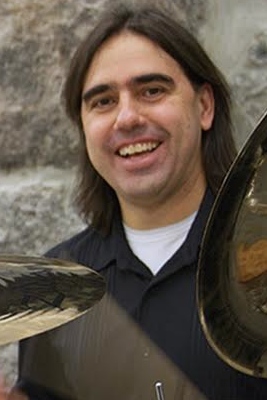Don't see what you're looking for?
Main Site
Berklee.eduCampuses and Schools

Alberto Netto
For media inquiries, please contact Media Relations
- Drummer, percussionist, author, and composer
- Performances and recordings with David Costa, Chico Gomes, Luiz Arruda Paes's Big Band, Aaron Scott, Claudio Roditi, Aaron Goldberg, Skip Hadden, Giovanni Hidalgo, Hermeto Pascoal, Anne Walsh, Filo Machado, and Matt Johnson
- First solo album, Indian Summer, recorded in 1997
- Author of Brazilian Rhythms for Drum Set and Percussion (Berklee Press)
- Clinician for Yamaha drums, Zildjian cymbals, Evans drumheads, Vic Firth sticks, and Shure microphones
- Owner/producer/engineer at Artdrums Recording Studios
- B.M., Berklee College of Music
"The first thing I like to work on with my students is coordination. From the simplest groove to the most challenging fills, coordination is key to getting the best sound out of the kit. Next, we work on timekeeping, consistency, and then, finally, technique and improvisation.
"I like to do this sequence of skill-building not only with their favorite genre but also with some of the major music genres out there, including jazz, Afro-Cuban, Brazilian, rock, and funk/fusion. I always ensure that students have command over the fundamentals and interpretation of each of these styles. I always teach them: Listen first, then play. In order to develop the correct feel and ability to interpret a style, they need to listen to the authentic or traditional sources of each style and analyze the main characteristics. I work with these diverse music styles because I believe that to be able to succeed and compete as a drummer in today’s music scene, a drummer must know the main elements of these styles.
"Just as important as understanding the groove is being able to communicate musically to the other members of the band. You may be able to play 300 notes per second, but if you don't groove, you will not be able to function within the band. Listen to what the other instruments are doing. Learn your main role as the timekeeper! Make people dance! Music comes first, then you.
"I make sure that students understand how to express themselves authentically, using proper articulation and phrasings when interpreting different kinds of music. It's like an actor interpreting different roles. One time they do comedy, another time drama, then a thriller, and so forth. When you know the roots and main elements of all the main grooves out there, you can communicate better both with audiences and other musicians, as well as with producers and arrangers.
"I encourage my students to take their college time at Berklee seriously, because what they do here will prepare them for 'real career' situations. Not just at Berklee but throughout their career, they will always need to do their homework, meet deadlines, and prepare the best they can for all auditions. They will have many chances to correct things here, but not as many once their career starts. They need to use their time wisely at Berklee.
"For more than 30 years as a performer, author, and educator, I have had the opportunity to play in a wide variety of styles in live concerts, television, and radio appearances. As a producer and owner of a recording studio for the past 15 years, I have had the opportunity to work with many great musicians on each of these music genres. I want the same for my students, and it inspires me to teach at Berklee, where I can help students build their own successful careers."
Get More Information
By requesting information from Berklee, you will receive emails about our educational programs, student resources, facilities, and more based on your selections.
Thank you for requesting information.
Check your inbox for an email from Berklee. You will start to receive program information, updates, and deadline reminders.
Find the program that's right for you with Berklee's Find Your Program tool.